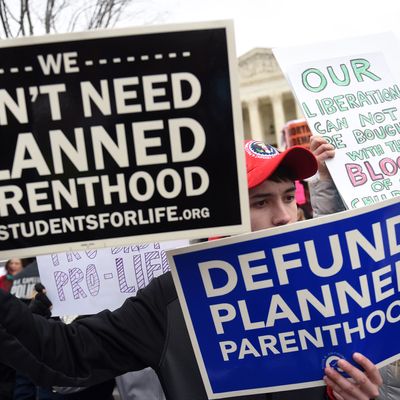
Over the years, I’ve had a long-running argument with fellow committed pro-choice writers about the sincerity of the people across the barricades from us in the endless battle over reproductive rights. Because, a long time ago, I was religiously motivated right-to-life activist, I have been prone to argue that many of those who protest at Planned Parenthood clinics and the Supreme Court are truly motivated by a sincere belief in fetal personhood, and a corresponding conviction that legalized abortion is not morally distinguishable from legalized infanticide or euthanasia or for that matter selective genocide. It’s safe to say, however, that the prevailing sentiment among abortion rights activists is that the anti-abortion movement is just applied misogyny — a derivative position from a general attitude of patriarchal contempt toward or fear of women’s sexuality and autonomy.
So it is interesting and telling that Ross Douthat, one of the more highly placed RTL voices in American political media, is raising the question about the connection between anti-abortion and anti-feminist views from within the ranks of the anti-abortion movement itself:
[T]he allegation of sexual assault against Brett Kavanaugh represents a uniquely dangerous moment for a pro-life movement that has spent decades working toward the goal of a fifth Supreme Court vote to amend or overturn Roe v. Wade …
Even if it wins its long-desired victory at the high court and more anti-abortion legislation becomes possible, a pro-life cause joined to a party that can’t win female votes and seems to have no time for women will never be able to achieve those legislative goals, or at least never outside a very few, very conservative states. And having that long-awaited victory accomplished by a male judicial appointee confirmed under a cloud of #MeToo suspicion seems like a good way to cement a perception that’s fatal to the pro-life movement’s larger purposes — the perception that you can’t be pro-woman and pro-life.
The anti-abortion movement’s alliance with anti-feminists obviously existed long before Brett Kavanaugh’s nomination to the Supreme Court. Yes, Donald Trump has dramatized the GOP’s misogynist tendencies in an indelible fashion, but overt anti-feminism has been rampant in that party’s dominant conservative wing since at least 1980, when Republicans dropped their ancient commitment to an Equal Rights Amendment from the party platform. By 2012, as Amanda Terkel noted, the GOP’s posture on women’s rights had all but been reduced to a negative:
Essentially the only mention of women’s rights in the 2012 GOP platform pertains to reproductive rights. There’s a whole section on “The Sanctity and Dignity of Human Life” that expresses the belief that women should not have access to abortion under any circumstances, even in cases of rape and incest.
Even if many individual Republicans — most obviously including Republican women — thought of themselves as “pro-woman and pro-life,” it has been a long time since there was any party-wide commitment to the first half of that formula.
Over the same period of time, something was happening in the core of the anti-abortion movement that perhaps Douthat, a Catholic, has not fully appreciated: its mass base is now found not among traditionalist Catholics, with their centuries-old teachings against abortion rooted in Aristotelian metaphysics and medieval/early modern biology, but among conservative Evangelical Protestants, who were at most ambivalent about abortion until the late 1970s. Unlike Catholics, Evangelicals have no ancient teaching tradition or Pope, and their sole source of authority, the Bible, has at most indirect and unclear references to abortion. It is hard to avoid the impression that the sudden and near-universal hostility to legalized abortion in Evangelical ranks is just a corollary to a general rule of intense hostility to “permissive” modern culture, the sexual revolution, and most of all challenges to patriarchal family roles.
The same conservative Evangelicals who are now the heartbeat of the RTL movement do not by and large share Douthat’s concerns about Donald J. Trump’s misogyny. From elites in the pulpit to the rank-and-file in the pews, they are enthusiastic supporters of the man. Perhaps RTLers like Ross Douthat feel they have been driven by circumstances into an accidental, even tragic, alliance with Republican misogynists. But for the bulk of the movement, there’s not much of a distinction left to worry about.
The other interesting aspect of Douthat’s piece is that he takes it for granted that Kavanaugh’s confirmation to the Supreme Court would be a major step toward the cause of recriminalizing abortion. The entire campaign for Kavanaugh, and his incessantly evasive comments on the constitutional law of reproductive rights, was based on denying or at least obscuring that central fact. This pattern of deception has become habitual among RTLers, who shed crocodile tears for the rare “unborn victims” of late-term abortions while quietly working to ban the vast majority of abortions that occur during the first trimester of pregnancy, and even some “abortifacient” birth control methods. And lying about their actual views on reproductive rights is an unwholesome bond they share with Republican politicians who understand that their goal of turning back the clock on both abortion rights and women’s rights is very unpopular.
A lot of the deception surrounding Kavanaugh’s confirmation, of course, was attributable to the need to provide cover for the last two pro-choice Republicans in Congress, Senators Susan Collins and Lisa Murkowski, who must now deal with the possibility that getting the judge through this crisis could look like double treason to their own gender. Ross Douthat is right to worry that it’s getting harder every day to disassociate pro-life from anti-woman views. It’s certainly getting harder for me to believe that anti-abortion activists care more about saving embryos than about shackling women.






























